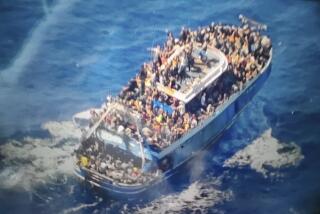Estonians and Swedes Mourn Victims of Ferry Disaster
- Share via
TALLINN, Estonia — People flocked to Estonia’s churches Sunday to honor more than 300 relatives, friends and compatriots killed in the worst maritime disaster in the small Baltic nation’s history.
At Tallinn’s Karli Church, people sang, prayed and shed tears for those who went down with the ill-fated ferry Estonia in the Baltic Sea on Wednesday.
“There is no answer for why this disaster has befallen us,” Pastor Gustav Piir told the congregation, which was much larger than usual.
“It is now a heavy burden for this nation,” Piir said, his voice booming across the high vaulted ceiling. “We feel helpless in the face of something we cannot explain.”
In a country of just 1.6 million people, virtually everyone knew a victim--or knew someone who did. It was as if 47,000 people in the United States had died in a single accident.
Swedes also gathered in churches Sunday to remember more than 500 of their compatriots who died in the tragedy. King Carl XVI Gustaf and Queen Silvia led an evening memorial service at Stockholm’s Lutheran Cathedral.
“Many of us have lost a neighbor or a work colleague aboard the Estonia. Words have little comfort at a moment like this,” Ingvar Carlsson, the newly elected prime minister, told the congregants, who included several survivors.
Finnish President Martti Ahtisaari attended a memorial service in Helsinki’s Lutheran Cathedral, and the Finnish Red Cross and the Lutheran Church took up collections for the Estonian victims of the disaster.
At the port in Tallinn where the ship began its final voyage, only to sink hours later in rough seas, people placed flowers and candles by the departure gate. Black ribbons fluttered from the radio antennas of many cars in the old, steepled capital.
At a memorial concert in the Estonia Concert Hall on Saturday, President Lennart Meri asked: “Why do we have to drink this bitter glass of pain and suffering?
“There is an answer to this eternal question,” he said, choking back tears. “Through suffering a person gets stronger. A nation gets stronger.”
Mart Laar, prime minister of the former Soviet republic, said that the sinking of the Estonia was the worst thing to happen to his country since Red Army troops invaded in 1944.
The biggest exodus of Estonians to the West occurred then, almost 50 years to the day before the ferry catastrophe. Scores of refugees went down in stormy weather as Soviet gunboats pursued them. Many succumbed in the same area as the Estonia.
“History has come back to us in a tragic form,” Laar said.
More to Read
Sign up for Essential California
The most important California stories and recommendations in your inbox every morning.
You may occasionally receive promotional content from the Los Angeles Times.













